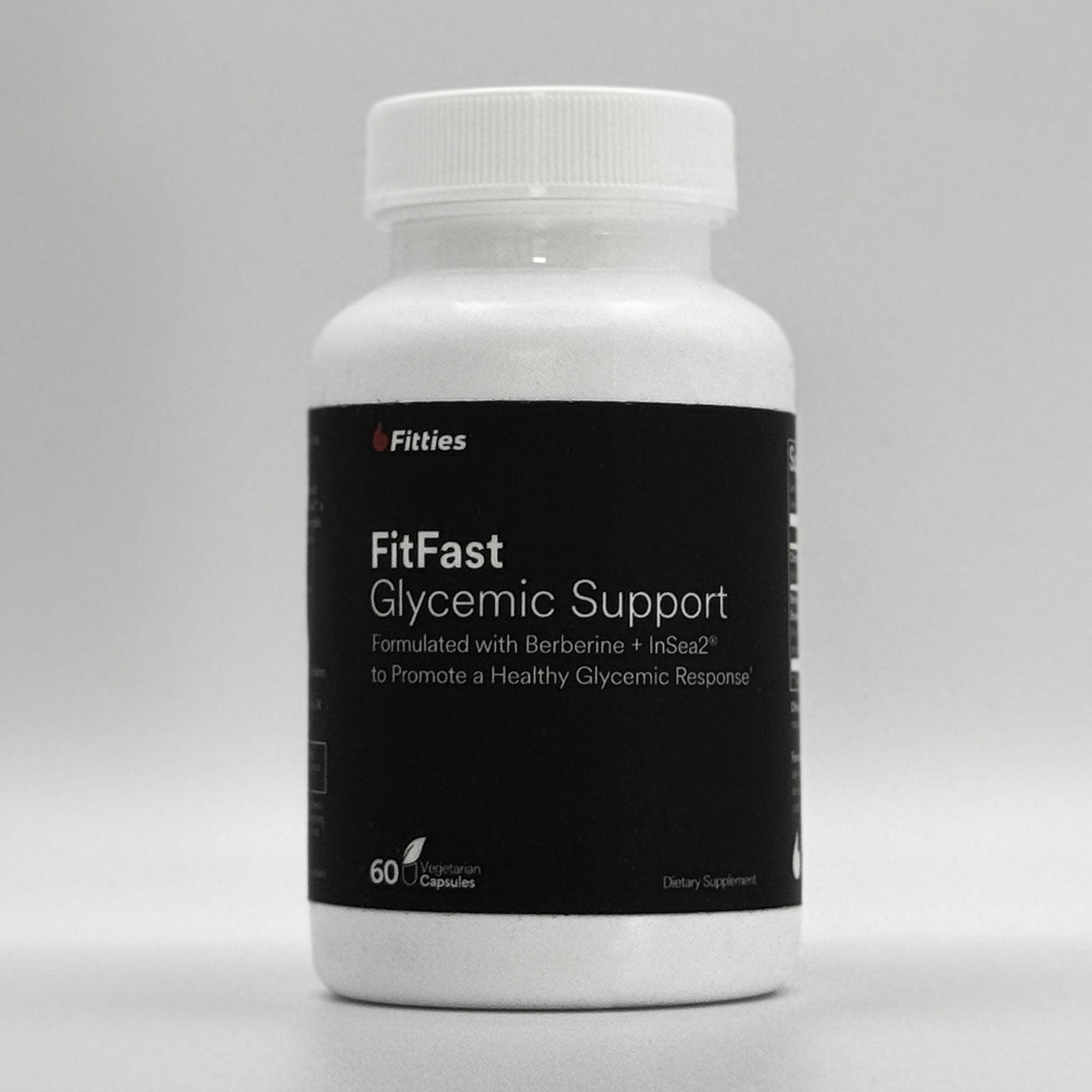
Medical References: FitFast
Medical-grade berberine and InSea2® blend from Fitties
Medical References: FitFast
Clinical Applications
- Supports a healthy glycemic response to foods*
- Helps support healthy blood glucose levels*
FitFast, featuring a blend of berberine and InSea2®, combines the natural benefits of berberine, an alkaloid found in plants known for its role in maintaining healthy blood sugar levels, with InSea2®, a rigorously researched polyphenol blend. InSea2® is sourced from sustainably harvested, wild brown seaweed and has been demonstrated to contribute positively to a healthy glycemic reaction to dietary intake.*
Discussion
Berberine, a naturally occurring alkaloid found in various plants, is renowned in both Ayurvedic and traditional Chinese medicine for its multiple therapeutic uses, notably for promoting healthy blood sugar levels and supporting insulin function.[1] While its positive impact on blood sugar is well-documented, the exact mechanisms remain partially understood. One proposed theory is that berberine positively influences gut microbiota, thereby affecting glucose metabolism.[2] Experimental studies in animals and cell cultures indicate that berberine potentially manages glucose levels through several pathways, including the activation of AMP-activated protein kinase, the JNK pathway, and the PPAR-alpha pathway.[3,4] Furthermore, it is known to suppress disaccharidase expression in the small intestine, reducing glucose production from carbohydrates. There's also evidence suggesting berberine enhances pancreatic beta-cell efficiency.*[5]
In-depth studies are required to fully understand berberine's role in non-diabetic individuals. However, numerous trials focusing on diabetic patients have explored its hypoglycemic potential as a supplementary treatment. These studies, involving type 2 diabetes patients and dosages ranging between 1,000 and 1,500 mg daily, have shown significant reductions in HbA1C, fasting blood glucose, and post-meal blood sugar levels.*[1]
InSea2®, a proprietary mix of polyphenols extracted from Ascophyllum nodosum and Fucus vesiculosus, two types of brown seaweed sustainably sourced from the North Atlantic, effectively inhibits enzymes critical for starch and sugar digestion, namely alpha-amylase and alpha-glucosidase. Clinical research indicates that InSea2 significantly lowers post-meal glucose levels, boosts insulin sensitivity, and aids in maintaining healthy blood sugar management.*[6,7]
A notable randomized, double-blind, placebo-controlled study involving 65 dysglycemic patients (N = 65) investigated the impact of InSea2 (alongside 7.5 mcg of chromium picolinate) over six months. Results showed 18.2% of participants in the treatment group achieved normal blood sugar levels, unlike the placebo group. There was also a notable shift from impaired fasting glycemia to impaired glucose tolerance in many participants, indicating enhanced insulin sensitivity and improved blood sugar control. In contrast, the placebo group, despite similar diet and exercise, exhibited declining glycemic health markers.*[6]
Another study, a double-blind, placebo-controlled, crossover trial with 23 healthy individuals (N = 23) aged 19-59, assessed InSea2's effect on blood glucose and insulin levels after carbohydrate intake. Participants consumed two capsules containing 250 mg of InSea2 30 minutes before a 50 g carbohydrate meal. The study observed significant modulation of insulin levels post-meal, suggesting InSea2's role in maintaining insulin balance after consuming carbohydrate-rich foods.*[7]
FitFast uniquely combines clinically researched amounts of berberine and InSea2. This formulation is designed to optimize the body's glycemic response to foods and sustain healthy blood sugar levels.*
References
- Imenshahidi M, Hosseinzadeh H. Phytother Res. 2019 Mar;33(3):504-523. doi:10.1002/ptr.6252.
- Han J, Lin H, Huang W. Med Sci Monit. 2011;17(7):RA164-RA167. doi:10.12659/ msm.881842.
- Zhang Q, Xiao X, Feng K, et al. Evid Based Complement Alternat Med. 2011;2011:924851. doi:10.1155/2011/924851.
- Zhou L, Yang Y, Wang X, et al. Metabolism. 2007;56(3):405-412. doi:10.1016/j. metabol.2006.10.025.
- Chen C, Yu Z, Li Y, et al. Am J Chin Med. 2014;42(5):1053-1070. doi:10.1142/ S0192415X14500669.
- Derosa G, Cicero AFG, D’Angelo A, et al. Phytother Res. 2019;33(3):791-797. doi:10.1002/ptr.6272.
- Paradis ME, Couture P, Lamarche B. Appl Physiol Nutr Metab. 2011;36(6):913- 919. doi:10.1139/H11-115.